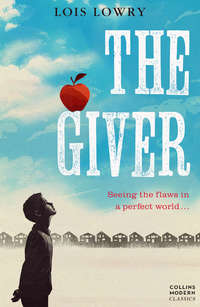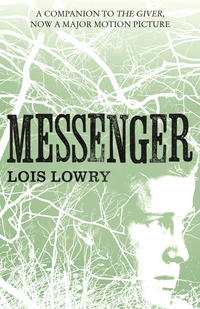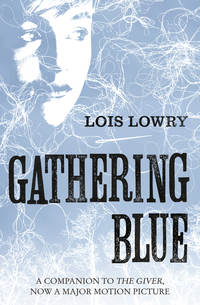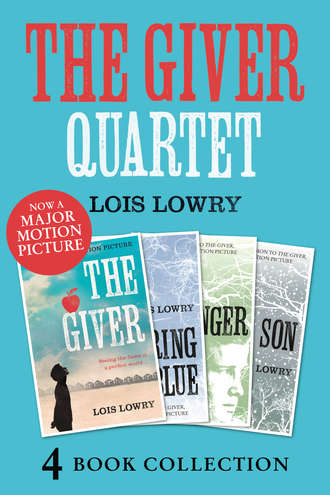
Полная версия
The Giver, Gathering Blue, Messenger, Son
“Gabe, you naughty thing,” Lily said, with a scolding little cluck towards the grinning toddler on the floor.
“So,” Father went on, “we obviously had to make the decision. Even I voted for Gabriel’s release when we had the meeting this afternoon.”
Jonas put down his fork and stared at his father. “Release?” he asked.
Father nodded. “We certainly gave it our best try, didn’t we?”
“Yes, we did,” Mother agreed emphatically.
Lily nodded in agreement, too.
Jonas worked at keeping his voice absolutely calm. “When?” he asked. “When will he be released?”
“First thing tomorrow morning. We have to start our preparations for the Naming Ceremony, so we thought we’d get this taken care of right away.
“It’s bye-bye to you, Gabe, in the morning,” Father had said, in his sweet, sing-song voice.
Jonas reached the opposite side of the river, stopped briefly, and looked back. The community where his entire life had been lived lay behind him now, sleeping. At dawn, the orderly, disciplined life he had always known would continue again, without him. The life where nothing was ever unexpected. Or inconvenient. Or unusual. The life without colour, pain or past.
He pushed firmly again at the pedal with his foot and continued riding along the road. It was not safe to spend time looking back. He thought of the rules he had broken so far: enough that if he were caught, now, he would be condemned.
First, he had left the dwelling at night. A major transgression.
Second, he had robbed the community of food: a very serious crime, even though what he had taken was leftovers, set out on the dwelling doorsteps for collection.
Third, he had stolen his father’s bicycle. He had hesitated for a moment, standing beside the bikeport in the darkness, not wanting anything of his father’s and uncertain, as well, whether he could comfortably ride the larger bike when he was so accustomed to his own.
But it was necessary because it had the child seat attached to the back.
And he had taken Gabriel, too.
He could feel the little head nudge his back, bouncing gently against him as he rode. Gabriel was sleeping soundly, strapped into the seat. Before he had left the dwelling, he had laid his hands firmly on Gabe’s back and transmitted to him the most soothing memory he could: a slow-swinging hammock under palm trees on an island somewhere, at evening, with a rhythmic sound of languid water lapping hypnotically against a beach nearby. As the memory seeped from him into the newchild, he could feel Gabe’s sleep ease and deepen. There had been no stir at all when Jonas lifted him from the crib and placed him gently into the moulded seat.
He knew that he had the remaining hours of night before they would be aware of his escape. So he rode hard, steadily, willing himself not to tire as the minutes and miles passed. There had been no time to receive the memories he and the Giver had counted on, of strength and courage. So he relied on what he had, and hoped it would be enough.
He circled the outlying communities, their dwellings dark. Gradually the distances between communities widened, with longer stretches of empty road. His legs ached at first; then, as time passed, they became numb.
At dawn Gabriel began to stir. They were in an isolated place; fields on either side of the road were dotted with thickets of trees here and there. He saw a stream, and made his way to it across a rutted, bumpy meadow; Gabriel, wide awake now, giggled as the bicycle jolted him up and down.
Jonas unstrapped Gabe, lifted him from the bike, and watched him investigate the grass and twigs with delight. Carefully he hid the bicycle in thick bushes.
“Morning meal, Gabe!” He unwrapped some of the food and fed them both. Then he filled the cup he had brought with water from the stream and held it for Gabriel to drink. He drank thirstily himself, and sat by the stream, watching the newchild play.
He was exhausted. He knew he must sleep, resting his own muscles and preparing himself for more hours on the bicycle. It would not be safe to travel in daylight.
They would be looking for him soon.
He found a place deeply hidden in the trees, took the newchild there, and lay down, holding Gabriel in his arms. Gabe struggled cheerfully as if it were a wrestling game, the kind they had played back in the dwelling, with tickles and laughter.
“Sorry, Gabe,” Jonas told him. “I know it’s morning, and I know you’ve just woken up. But we have to sleep now.”
He cuddled the small body close to him, and rubbed the little back. He murmured to Gabriel soothingly. Then he pressed his hands firmly and transmitted a memory of deep, contented exhaustion. Gabriel’s head nodded, after a moment, and fell against Jonas’s chest.
Together the fugitives slept through the first dangerous day.
The most terrifying thing was the planes. By now, days had passed; Jonas no longer knew how many. The journey had become automatic: the sleep by days, hidden in underbrush and trees; the finding of water; the careful division of scraps of food, augmented by what he could find in the fields. And the endless, endless miles on the bicycle by night.
His leg muscles were taut now. They ached when he settled himself to sleep. But they were stronger, and he stopped now less often to rest. Sometimes he paused and lifted Gabriel down for a brief bit of exercise, running down the road or through a field together in the dark. But always, when he returned, strapped the uncomplaining toddler into the seat again and remounted, his legs were ready.
So he had enough strength of his own, and had not needed what the Giver might have provided, had there been time.
But when the planes came, he wished that he could have received the courage.
He knew they were search planes. They flew so low that they woke him with the noise of their engines, and sometimes, looking out and up fearfully from the hiding places, he could almost see the faces of the searchers.
He knew that they could not see colour, and that their flesh, as well as Gabriel’s light golden curls, would be no more than smears of grey against the colourless foliage. But he remembered from his science and technology studies at school that the search planes used heat-seeking devices which could identify body warmth and would hone in on two humans huddled in shrubbery.
So always, when he heard the aircraft sound, he reached to Gabriel and transmitted memories of snow, keeping some for himself. Together they became cold; and when the planes were gone, they would shiver, holding each other, until sleep came again.
Sometimes, urging the memories into Gabriel, Jonas felt that they were more shallow, a little weaker than they had been. It was what he had hoped, and what he and the Giver had planned: that as he moved away from the community, he would shed the memories and leave them behind for the people. But now, when he needed them, when the planes came, he tried hard to cling to what he still had, of cold, and to use it for their survival.
Usually the aircraft came by day, when they were hiding. But he was alert at night, too, on the road, always listening intently for the sound of the engines. Even Gabriel listened, and would call out, “Plane! Plane!” sometimes before Jonas had heard the terrifying noise. When the aircraft searchers came, as they did occasionally, during the night as they rode, Jonas sped to the nearest tree or bush, dropped to the ground, and made himself and Gabriel cold. But it was sometimes a frighteningly close call.
As he pedalled through the nights, through isolated landscape now, with the communities far behind and no sign of human habitation around him or ahead, he was constantly vigilant, looking for the next nearest hiding place should the sound of engines come.
But the frequency of the planes diminished. They came less often, and flew, when they did come, less slowly, as if the search had become haphazard and no longer hopeful. Finally there was an entire day and night when they did not come at all.
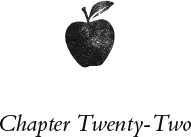
NOW THE LANDSCAPE was changing. It was a subtle change, hard to identify at first. The road was narrower, and bumpy, apparently no longer tended by road crews. It was harder, suddenly, to balance on the bike, as the front wheel wobbled over stones and ruts.
One night Jonas fell, when the bike jolted to a sudden stop against a rock. He grabbed instinctively for Gabriel; and the newchild, strapped tightly in his seat, was uninjured, only frightened when the bike fell to its side. But Jonas’s ankle was twisted and his knees were scraped and raw, blood seeping through his torn trousers. Painfully he righted himself and the bike, and reassured Gabe.
Tentatively he began to ride in daylight. He had forgotten the fear of the searchers, who seemed to have diminished into the past. But now there were new fears; the unfamiliar landscape held hidden, unknown perils.
Trees became more numerous, and the forests beside the road were dark and thick with mystery. They saw streams more frequently now and stopped often to drink. Jonas carefully washed his injured knees, wincing as he rubbed at the raw flesh. The constant ache of his swollen ankle was eased when he soaked it occasionally in the cold water that rushed through roadside gullies.
He was newly aware that Gabriel’s safety depended entirely upon his own continued strength.
They saw their first waterfall, and for the first time wildlife.
“Plane! Plane!” Gabriel called, and Jonas turned swiftly into the trees, though he had not seen planes in days, and he did not hear an aircraft engine now. When he stopped the bicycle in the shrubbery and turned to grab Gabe, he saw the small chubby arm pointing towards the sky.
Terrified, he looked up, but it was not a plane at all. Though he had never seen one before, he identified it from his fading memories, for the Giver had given them to him often. It was a bird.
Soon there were many birds along the way, soaring overhead, calling. They saw deer; and once, beside the road, looking at them curious and unafraid, a small reddish-brown creature with a thick tail, whose name Jonas did not know. He slowed the bike and they stared at one another until the creature turned away and disappeared into the woods.
All of it was new to him. After a life of Sameness and predictability, he was awed by the surprises that lay beyond each curve of the road. He slowed the bike again and again to look with wonder at wild flowers, to enjoy the throaty warble of a new bird nearby, or merely to watch the way wind shifted the leaves in the trees. During his twelve years in the community, he had never felt such simple moments of exquisite happiness.
But there were desperate fears building in him now as well. The most relentless of his new fears was that they would starve. Now that they had left the cultivated fields behind them, it was almost impossible to find food. They finished the meagre store of potatoes and carrots they had saved from the last agricultural area, and now they were always hungry.
Jonas knelt by a stream and tried without success to catch a fish with his hands. Frustrated, he threw rocks into the water, knowing even as he did so that it was useless. Finally, in desperation, he fashioned a makeshift net, looping the strands of Gabriel’s blanket around a curved stick.
After countless tries, the net yielded two flopping silvery fish. Methodically Jonas hacked them to pieces with a sharp rock and fed the raw shreds to himself and to Gabriel. They ate some berries, and tried without success to catch a bird.
At night, while Gabriel slept beside him, Jonas lay awake, tortured by hunger, and remembered his life in the community where meals were delivered to each dwelling every day.
He tried to use the flagging power of his memory to recreate meals, and managed brief, tantalising fragments: banquets with huge roasted meats; birthday parties with thick-frosted cakes; and lush fruits picked and eaten, sun-warmed and dripping, from trees.
But when the memory glimpses subsided, he was left with the gnawing, painful emptiness. Jonas remembered, suddenly and grimly, the time in his childhood when he had been chastised for misusing a word. The word had been “starving”. You have never been starving, he had been told. You will never be starving.
Now he was. If he had stayed in the community, he would not be. It was as simple as that. Once he had yearned for choice. Then, when he had had a choice, he had made the wrong one: the choice to leave. And now he was starving.
But if he had stayed …
His thoughts continued. If he had stayed, he would have starved in other ways. He would have lived a life hungry for feelings, for colour, for love.
And Gabriel? For Gabriel there would have been no life at all. So there had not really been a choice.
It became a struggle to ride the bicycle as Jonas weakened from lack of food, and realised at the same time that he was encountering something he had for a long time yearned to see: hills. His sprained ankle throbbed as he forced the pedal downwards in an effort that was almost beyond him.
And the weather was changing. It rained for two days. Jonas had never seen rain, though he had experienced it often in the memories. He had liked those rains, enjoyed the new feeling of it, but this was different. He and Gabriel became cold and wet, and it was hard to get dry, even when sunshine occasionally followed.
Gabriel had not cried during the long frightening journey. Now he did. He cried because he was hungry and cold and terribly weak. Jonas cried, too, for the same reasons, and another reason as well. He wept because he was afraid now that he could not save Gabriel. He no longer cared about himself.
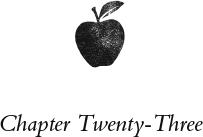
JONAS FELT MORE and more certain that the destination lay ahead of him, very near now in the night that was approaching. None of his senses confirmed it. He saw nothing ahead except the endless ribbon of road unfolding in twisting narrow curves. He heard no sound ahead.
Yet he felt it: felt that Elsewhere was not far away. But he had little hope left that he would be able to reach it. His hope diminished further when the sharp, cold air began to blur and thicken with swirling white.
Gabriel, wrapped in his inadequate blanket, was hunched, shivering, and silent in his little seat. Jonas stopped the bike wearily, lifted the child down, and realised with heartbreak how cold and weak Gabe had become.
Standing in the freezing mound that was thickening around his numb feet, Jonas opened his own tunic, held Gabriel to his bare chest, and tied the torn and dirty blanket around them both. Gabriel moved feebly against him and whimpered briefly into the silence that surrounded them.
Dimly, from a nearly forgotten perception as blurred as the substance itself, Jonas recalled what the whiteness was.
“It’s called snow, Gabe,” Jonas whispered. “Snowflakes. They fall down from the sky, and they’re very beautiful.”
There was no response from the child who had once been so curious and alert. Jonas looked down through the dusk at the little head against his chest. Gabriel’s curly hair was matted and filthy, and there were tear stains outlined in dirt on his pale cheeks. His eyes were closed. As Jonas watched, a snowflake drifted down and was caught briefly for a moment’s sparkle in the tiny fluttering eyelashes.
Wearily he remounted the bicycle. A steep hill loomed ahead. In the best of conditions, the hill would have been a difficult, demanding ride. But now the rapidly deepening snow obscured the narrow road and made the ride impossible. His front wheel moved forward imperceptibly as he pushed on the pedals with his numb, exhausted legs. But the bicycle stopped. It would not move.
He got off and let it drop sideways into the snow. For a moment he thought how easy it would be to drop beside it himself, to let himself and Gabriel slide into the softness of snow, the darkness of night, the warm comfort of sleep.
But he had come this far. He must try to go on.
The memories had fallen behind him now, escaping from his protection to return to the people of his community. Were there any left at all? Could he hold on to a last bit of warmth? Did he still have the strength to Give? Could Gabriel still Receive?
He pressed his hands into Gabriel’s back and tried to remember sunshine. For a moment it seemed that nothing came to him, that his power was completely gone. Then it flickered suddenly, and he felt tiny tongues of heat begin to creep across and into his frozen feet and legs. He felt his face begin to glow and the tense, cold skin of his arms and hands relax. For a fleeting second he felt that he wanted to keep it for himself, to let himself bathe in sunlight, unburdened by anything or anyone else.
But the moment passed and was followed by an urge, a need, a passionate yearning to share the warmth with the one person left for him to love. Aching from the effort, he forced the memory of warmth into the thin, shivering body in his arms.
Gabriel stirred. For a moment they both were bathed in warmth and renewed strength as they stood hugging each other in the blinding snow.
Jonas began to walk up the hill.
The memory was agonisingly brief. He had trudged no more than a few yards through the night when it was gone and they were cold again.
But his mind was alert now. Warming himself ever so briefly had shaken away the lethargy and resignation and restored his will to survive. He began to walk faster on feet that he could no longer feel. But the hill was treacherously steep; he was impeded by the snow and his own lack of strength. He didn’t make it very far before he stumbled and fell forward.
On his knees, unable to rise, Jonas tried a second time. His consciousness grasped at a wisp of another warm memory, and tried desperately to hold it there, to enlarge it, and pass it into Gabriel. His spirits and strength lifted with the momentary warmth and he stood. Again, Gabriel stirred against him as he began to climb.
But the memory faded, leaving him colder than before.
If only he had had time to receive more warmth from the Giver before he escaped! Maybe there would be more left for him now. But there was no purpose in if-onlys. His entire concentration now had to be on moving his feet, warming Gabriel and himself, and going forward.
He climbed, stopped, and warmed them both briefly again, with a tiny scrap of memory that seemed certainly to be all he had left.
The top of the hill seemed so far away, and he did not know what lay beyond. But there was nothing left to do but continue. He trudged upwards.
As he approached the summit of the hill at last, something began to happen. He was not warmer; if anything, he felt more numb and more cold. He was not less exhausted; on the contrary, his steps were leaden, and he could barely move his freezing, tired legs.
But he began, suddenly, to feel happy. He began to recall happy times. He remembered his parents and his sister. He remembered his friends, Asher and Fiona. He remembered the Giver.
Memories of joy flooded through him suddenly.
He reached the place where the hill crested and he could feel the ground under his snow-covered feet become level. It would not be uphill any more.
“We’re almost there, Gabriel,” he whispered, feeling quite certain without knowing why. “I remember this place, Gabe.” And it was true. But it was not a grasping of a thin and burdensome recollection; this was different. This was something that he could keep. It was a memory of his own.
He hugged Gabriel and rubbed him briskly, warming him, to keep him alive. The wind was bitterly cold. The snow swirled, blurring his vision. But somewhere ahead, through the blinding storm, he knew there was warmth and light.
Using his final strength, and a special knowledge that was deep inside him, Jonas found the sledge that was waiting for them at the top of the hill. Numbly his hands fumbled for the rope.
He settled himself on the sledge and hugged Gabe close. The hill was steep but the snow was powdery and soft, and he knew that this time there would be no ice, no fall, no pain. Inside his freezing body, his heart surged with hope.
They started down.
Jonas felt himself losing consciousness and with his whole being willed himself to stay upright atop the sledge, clutching Gabriel, keeping him safe. The runners sliced through the snow and the wind whipped at his face as they sped in a straight line through an incision that seemed to lead to the final destination, the place that he had always felt was waiting, the Elsewhere that held their future and their past.
He forced his eyes open as they went downwards, downwards, sliding, and all at once he could see lights, and he recognised them now. He knew they were shining through the windows of rooms, that they were the red, blue and yellow lights that twinkled from trees in places where families created and kept memories, where they celebrated love.
Downwards, downwards, faster and faster. Suddenly he was aware with certainty and joy that below, ahead, they were waiting for him; and that they were waiting, too, for the baby. For the first time, he heard something that he knew to be music. He heard people singing.
Behind him, across vast distances of space and time, from the place he had left, he thought he heard music too. But perhaps it was only an echo.
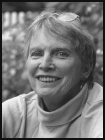

It’s hard to identify when I began to be aware that The Giver was different from the previous twenty-plus novels I had written for kids. Not while I was writing it, surely. I felt that I was writing an adventure story, trying to make each chapter a cliffhanger; well, I had done that precise thing in Number the Stars several years before. I was trying to create a likable, sympathetic main character with a lot of integrity and a certain amount of introspection: just what I had done in every book I had written for years, from A Summer to Die to Anastasia Krupnik and Rabble Starkey.
So it was not during the writing process, there at my desk for those weeks – eventually months – in 1993 that I realised something was unusual.
But it was also not the day that a radiogram with the news of the Newbery Medal was slipped under the door of my cabin on a boat in Antarctica a year or so later.
It was someplace in between. It was when I began to hear from readers.
I have always heard from readers. I like your book. It made me laugh. Please write back. Anastasia is just like me. Meg is just like me. J.P. is just like me. Please write back. Write more books. Put my name in a book. Send me your autograph.
But suddenly, after The Giver was published, the tone of the letters was different. They still came, most of them, from young people. But now they were not class assignments. They weren’t decorated with stickers and doodles.
Instead, they were long, carefully thought-out, passionate responses to a book that had raised questions in their minds: questions about their own lives, their own futures, decisions they were making, values that they were wondering about for the first time.
At the same time, there came letters from adults. Not the usual school librarians, not the occasional parent. These letters came from adults unrelated to the world of “children’s literature” – these were from adults who had probably not read a “kids’ book” since they were kids themselves. One came from the CEO of a major corporation. One from a Baptist minister. One from a Trappist monk. One from a victim of a multiple-personality disorder. And countless others from the most ordinary of people who seemed, actually, to be startled that a book they picked up casually (“My son asked me to read this.” “I picked this up at a bookstore because the cover looked intriguing.” “My cleaning lady recommended this book to me!”) had so affected them that they felt compelled, for the first time in their lives, to contact an author.



